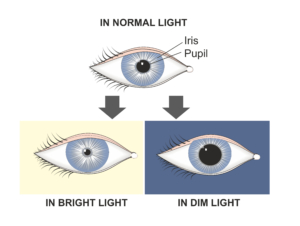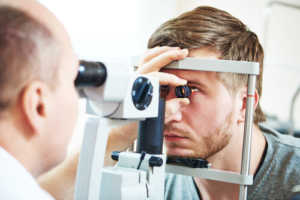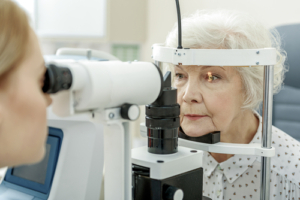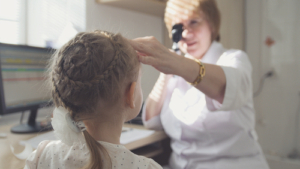What To Expect When You Have Your Pupils Dilated
Eye doctors regularly apply eye drops to dilate patients’ pupils. Using these special kinds of eye drops allows your eye doctor to see the interior of the eyes.
There are many reasons to have your pupils dilated. Keep reading for some insights into what to expect when you have your eyes dilated and why you may need pupil dilation!
What is Eye Dilation?

The pupils are located at the center part of the front of your eye. They focus light on the retina at the back of the eye.
These black circles grow larger in dim light and smaller in bright light. Muscles in the iris, which is the colored part of the eye, widen and narrow the pupil.
Your pupils naturally dilate to ensure you have enough illumination to see. During an eye exam, an eye doctor may need to widen the pupils to allow them to see into the back of the eye.
What Should You Expect When You Have Your Pupils Dilated?
If you’re getting your eyes dilated during a comprehensive eye exam, this part will occur toward the end of the appointment. This timing allows the eye doctor to perform other tests first. For example, they may have you read letters off a chart to measure your visual acuity.
Then, your eye doctor or a nurse will apply one dilation drop to each eye they plan to examine. You may feel minor stinging for a few moments.

The drops can take 20 to 30 minutes to take effect. You may be asked to sit in the waiting room during this time. Do not go outside as you will quickly become light sensitive.
Your eyes will grow blurry, so don’t plan to read or scroll through social media as you wait. Instead, you can listen to an audiobook or podcast for entertainment.
A nurse will check your eyes to ensure your pupils are fully dilated. When you’re ready, you will return to the exam room for your check-up.
The eye doctor will perform routine tests to evaluate your eye health and vision. They will look deep into the eye using specialized lights.
The medication effects last four to six hours for adults and up to a day for children. Side effects may include sensitivity to light and blurry vision.
Bring sunglasses to wear after the appointment to protect your eyes. Even normal indoor light may be overwhelming.
Your eye doctor might provide throw-away wrap-around sunglasses. These unique models offer sun protection at the front and sides of the eyes. You may find these more comfortable if you are especially light-sensitive.
Consider taking time off from work as it may be difficult to read or use the computer after you’ve had your pupils dilated. You’ll only need to take off an afternoon or a half-day at most to allow your eyes to get back to normal.
Sight-dependent activities can strain your eyes and cause temporary headaches. Have someone pick you up or use a rideshare app after completing your appointment. Most people cannot safely drive after pupil dilation because they can’t see well for several hours.
When Do I Need My Pupils Dilated?
Age, pre-existing conditions, and family health history are a few common factors that will help determine when an eye doctor will recommend dilating your pupils.

Caucasian adults over the age of 60 should get their eyes dilated annually. Once you’re at least 60, your likelihood of developing eye diseases increases yearly.
Hispanic and African Americans have an increased risk of developing glaucoma. If this describes you, you should talk to your eye doctor about having your eyes dilated every one to two years after turning 40.
If you have diabetes, your eye doctor may recommend that you have your eyes dilated every year. Some people who have diabetes have smaller pupils, making it necessary to dilate them. Having your pupils dilated may be the easiest way to know if your eyes are healthy during a comprehensive eye exam in this case.
Dilating your pupils also makes it easier to look for any signs of diabetic retinopathy. The condition occurs when people with diabetes lose vision due to blood vessels in their eyes changing.
People with high blood pressure are more likely to have glaucoma, as well as hypertensive retinopathy. Increased fluid in the eye can rupture blood vessels and cause swelling. Pupil dilation can help eye doctors diagnose and treat these conditions.
If you suffer an eye injury or undergo a procedure, you may also have your eyes dilated. The drops prevent and reduce inflammation, which can improve healing and reduce recovery time.
An eye doctor may suggest dilating a child’s pupils if they suspect that they need to start wearing glasses. Children need two kinds of medicated drops to relax the focusing muscles and enlarge the pupils.

These changes allow an eye doctor to assess if they have refractive errors like nearsightedness, farsightedness, or astigmatism. Refractive errors occur when the shape of the eye prevents light from properly focusing on the retina.
The light should focus directly on the retina, and when it doesn’t, it causes problems with vision. Eye doctors treat many of these issues with glasses or contact lenses.
Dilation drops are also used for chronic conditions. If you have a lazy eye or amblyopia, you may take daily drops to relax muscles in the eye and encourage the eyes to look parallel.
At Eye Consultants of North Dakota, we offer high-tech solutions and personalized care. Our team provides routine eye exams in addition to pupil dilation and other eye care services when necessary.
Are you wondering if it’s time to schedule a comprehensive eye exam with pupil dilation? Request an appointment at Eye Consultants of North Dakota in Fargo, ND, today!



